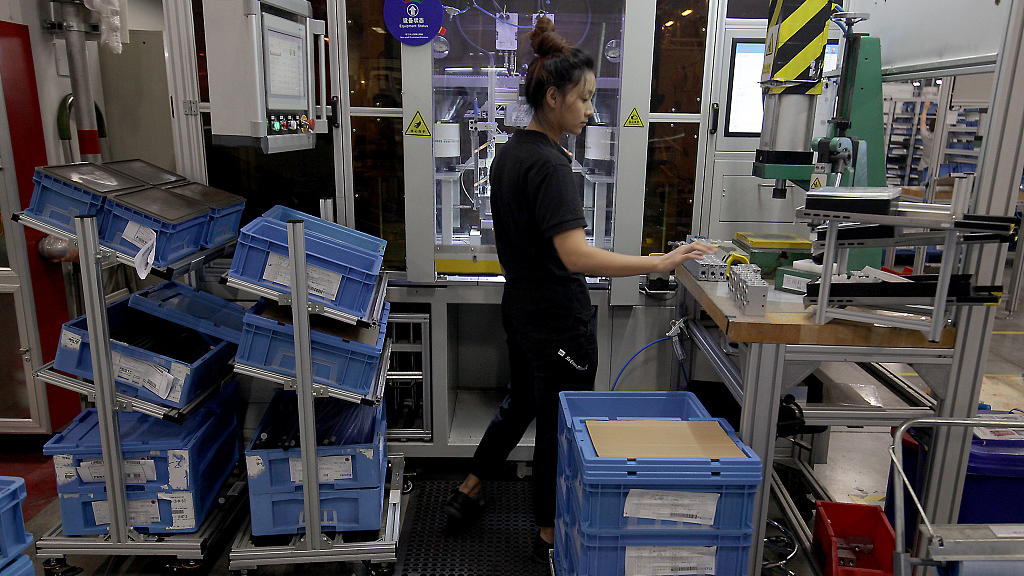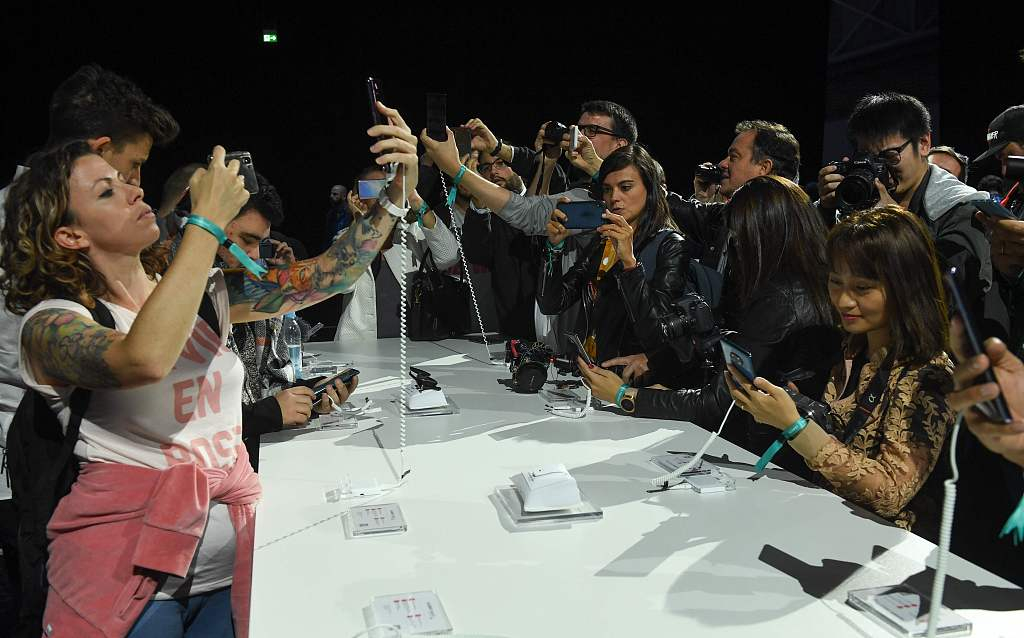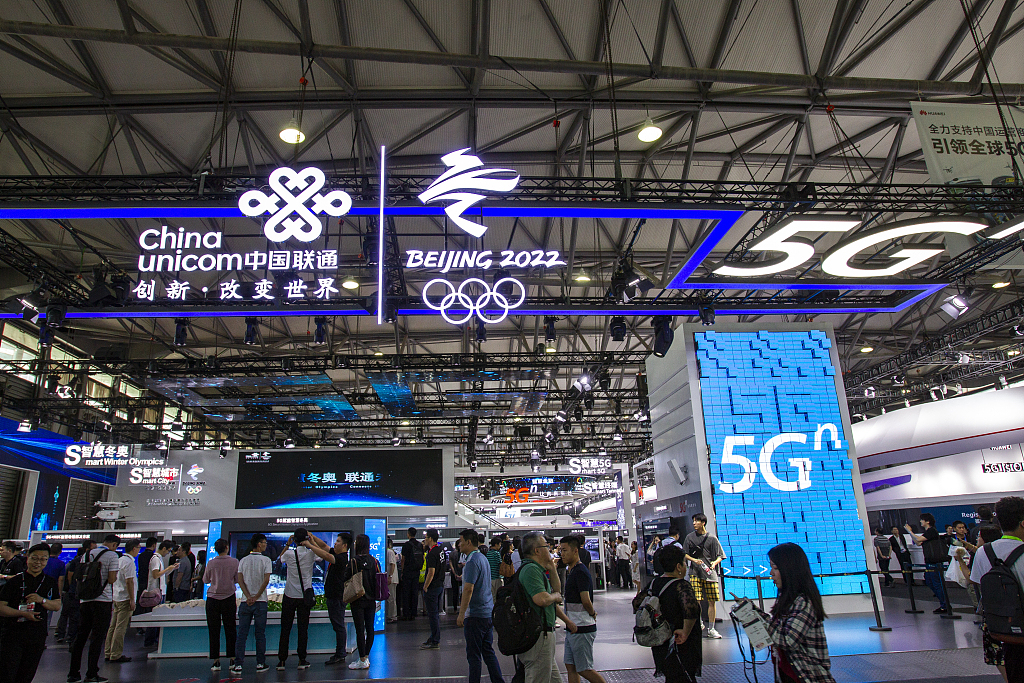
Chinese employees are working at Festo's manufacturing headquarters in Jinan, Shandong Province, October 10, 2019. Festo is a leading manufacturer of automation technology and a global market leader in basic and advanced technology training. /VCG Photo
Chinese employees are working at Festo's manufacturing headquarters in Jinan, Shandong Province, October 10, 2019. Festo is a leading manufacturer of automation technology and a global market leader in basic and advanced technology training. /VCG Photo
Editor's Note: Huang Yongfu is a senior fellow at the International Cooperation Center (ICC) of the National Development and Reform Commission of the People's Republic of China. The article reflects the author's opinions, and not necessarily the views of CGTN.
The 13th round of the China-U.S. trade talks has led to a rough framework that includes Beijing agreeing to purchase American farm products and Washington shelving the increase in tariffs set for this week. U.S. President Donald Trump applauded the progress and said it could lead to a "substantial phase one deal" that could be signed by him and Chinese President Xi Jinping later on.
However, the easing of restrictions on Huawei wasn't included in this deal but would be handled in a separate process. Many hawks in the U.S. government, including Senate Minority Leader Chuck Schumer, warned negotiators not to loosen restrictions on Huawei, given the national security risks.
Moreover, on October 7, the U.S. Department of Commerce blacklisted 28 Chinese entities, including eight artificial intelligence (AI) companies. The move to strike at China's AI industry further reflects the U.S.'s agenda to disentangle technological and commercial ties between two major powers.
As China's rapid development in 5G, AI, robotics, gene editing, and the data flows in recent years, the Trump Administration has been increasingly worried about the possibility that China is about to surpass the U.S.
To protect its national interest, the U.S. has defined China as a "strategic competitor" and aggressively deployed its economic arsenal to lock down technological leadership in a number of sectors considered critical for the so-called national security reasons. It is trying to block the free flow of goods, data, ideas and money across borders and isolate China from the global supply chain.
But, can attacking foreign tech firms or building walls to protect domestic technology fix U.S.'s problem?

Despite U.S. sanctions, Huawei is received differently on the other side of the Atlantic Ocean. The picture shows people exploring Huawei's latest smartphones after they were revealed at a show by Huawei in Munich, southern Germany, September 19, 2019. /VCG Photo
Despite U.S. sanctions, Huawei is received differently on the other side of the Atlantic Ocean. The picture shows people exploring Huawei's latest smartphones after they were revealed at a show by Huawei in Munich, southern Germany, September 19, 2019. /VCG Photo
The entangled nature of global supply chains
Supply chains are highly specialized and globally interconnected, especially for the tech sector. No technology firm is an island. They belong to a global web of innovation where things are not developed by one company or country but globally on open platforms. Under specific rules, tech companies can learn and take inspiration from each other regardless of their national origins.
It took decades to build this interconnected supply chain, which means that breaking or weaponizing interdependence will hobble the firms' innovation advances and make hundreds of smaller suppliers go bust. Replacing it will take decades and cost a fortune.
Interdependence cuts both ways. Export controls are estimated to cost American technology firms considerably over the years since Huawei is a big customer for American technology firms. It is a big customer of Qorvo, which produces wireless communication chips and derives 15 percent of its revenue from Huawei. It is also a big customer of Micron, a company that specializes in memory chips.
As tech hardware firms around the world mostly depend on production in China, the intensified tech war has caused big hardware firms to tweak their supply chains and retailers to shift their sourcing from China to elsewhere. Banks have to cut their connection to some of their counter-parties to avoid American sanctions. The immensely complex global network of financial, commercial and production ties is under extensive adjustment.

The globalized supply chain has ensured that any disruption of one link could destabilize every company involved up and down the chain, especially in tech companies where both intellectual and material products are not created in isolation from each other. /VCG Photo
The globalized supply chain has ensured that any disruption of one link could destabilize every company involved up and down the chain, especially in tech companies where both intellectual and material products are not created in isolation from each other. /VCG Photo
Regulation is the right way forward
U.S. security-driven politics are harming growth, competition, and the global supply chain while failing to protect consumers and industries.
Much of the world seems to succumb to the security-driven politics powered by populists, nationalists, and protectionists that champion the decoupling of the global supply chains and cause setbacks in economic globalization. Instead of blaming one another for the challenges generated by technological progress, we should work together to address them.
The world needs a positive and offensive strategy for competition and a fair playing field with international norms and standards that shape new technologies, defend our innovation system and allow cooperation with each other in fruitful ways. No country should be excluded, as long as it rises to global standards.
More sophisticated debates on security issues should be encouraged that move beyond political agendas. They should focus on the crucial aspect of regulatory design and propose feasible suggestions that safeguard the security of information technology products and services under the premise of fairness, justice, and non-discrimination.
The Global System for Mobile Communications, a mandatory technical standard, was enforced in the EU in 1987 and then adopted globally, has regulated a world-wide market for hardware and services that opened up a huge economic sector that brought financial benefits for firms around the world.
An encouraging development is that the new EU leadership is taking a similar approach to the digital economy, especially by issuing new regulations to limit facial-recognition technology, upgrading the bloc's liability and safety rules for digital platforms, and enforcing the bloc's data protection regime to ensure that users and businesses control, share, and use their data properly.
The world should take notice.
(If you want to contribute and have specific expertise, please contact us at opinions@cgtn.com.)